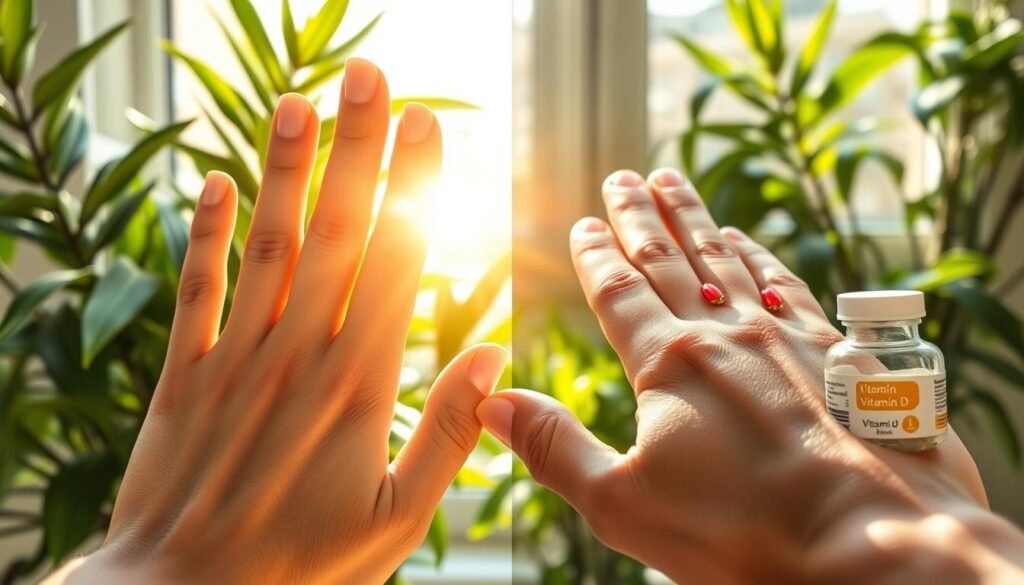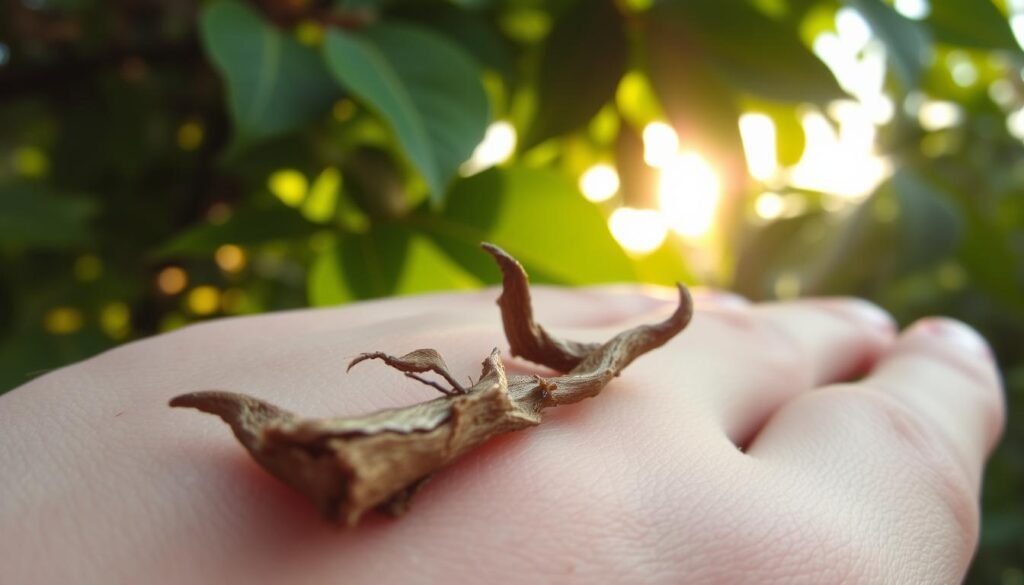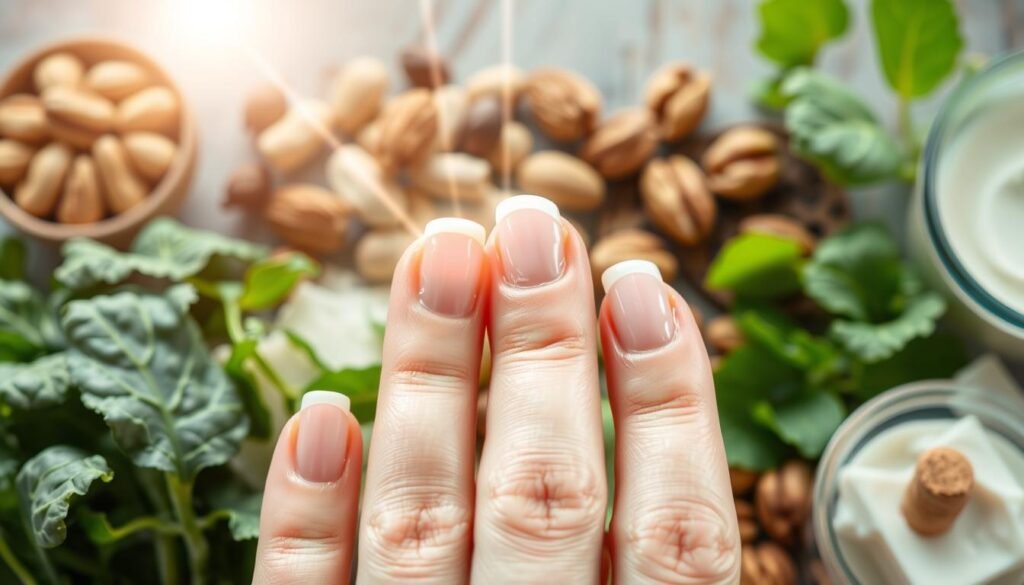Did you know that nearly 42% of Americans don’t get enough vitamin D? This lack of vitamin D can affect many parts of our health, including our nails. Vitamin D helps keep bones and nails strong. Without enough of it, people might see their nails break easily or look yellow.
Understanding the link between vitamin D and nail health is key. People with brittle nails should look into their vitamin D levels. By getting enough of this nutrient, you can have stronger, healthier nails.
Key Takeaways
- Low vitamin D levels can lead to brittle nails.
- Brittle nails may present symptoms such as fragmentation and crumbliness.
- 42% of Americans are currently vitamin D deficient.
- Nutrition plays a critical role in nail strength.
- Monitoring vitamin D status can help prevent nail health issues.
- Stronger nails may reflect an overall improvement in health.
Understanding Nail Composition
Nails are more than just simple coverings. They are made up mostly of keratins, which is interesting. Hair-type keratins make up about 80-90% of the nail plate. Epithelial keratins add another 10-20%. This mix is key for strong, healthy nails.
But nails need more than just keratin to be at their best. They also need minerals like magnesium, calcium, iron, zinc, and copper. These minerals help nails stay tough and shiny. They affect how nails grow and look.
Water in nails is also very important. It keeps them from getting too hard. If nails have less than 16% water, they can break easily. They are best at around 18% water. This makes them flexible but strong.
Knowing what nails are made of helps us keep them healthy. It’s all about the right mix of keratin and minerals. With this knowledge, we can work on having stronger, better nails.
What Are Brittle Nails?
Brittle nails are too fragile, which means they break or split often. In cases of brittle nails, you might see signs like onychorrhexis, which is when nails split lengthwise. Another sign is onychoschizia, or the peeling of nail layers. These problems show the nail is not healthy, often because of not getting the right nutrients.
Many things can make brittle nails worse. Not getting enough proteins and vitamins can lead to brittle nail syndrome (BNS). People who don’t eat well can get BNS, and it affects how they look and feel about themselves.
The American Osteopathic College of Dermatology (AOCD) says women get brittle nails more than men. Brittle nails can be due to too little or too much moisture. Hard and brittle nails need more moisture, while soft ones have too much.
- Getting older can make nails weaker.
- Anemia can cause extreme tiredness and brittle nails.
- Thyroid problems can stop nails from getting minerals, causing them to split.
- Using nail polish remover a lot can make nails more brittle.
If your nail problems are bad and don’t go away, see a doctor. This is very important if you also feel tired or your weight changes. Knowing about your nails can help in taking care of them. It leads to better treatment for brittle nails.
Vitamin D and Nail Health
Getting enough vitamin D is key for healthy nails. Without it, nails can become fragile and easily break. Knowing that vitamin D helps with nutrient absorption and immune function shows why it’s crucial for nail health.
The Role of Vitamin D in Nutrient Absorption
Vitamin D helps control the body’s calcium. This mineral is needed for nails to stay healthy. If you don’t get enough vitamin D, your nails might become weak. Eating foods high in vitamin D, like fatty fish or fortified dairy, can make nails stronger.
Vitamin D’s Impact on Immune Function
A healthy immune system is vital for nail health. Immune problems can lead to nail issues. Adequate vitamin D can boost your immune system. This might make nails harder and healthier. Treatments for vitamin D lack have improved nail condition in some patients.

Common Symptoms of Vitamin D Deficiency
Knowing the signs of vitamin D deficiency is key to better health. Problems with nails are a big sign many miss. Noticing changes in nails, like them getting brittle or changing color, is important. It helps catch deficiencies early.
Nail Brittleness
Nail brittleness can be a sign of low vitamin D. Brittle nails might break easily which can be painful. It also makes nails look bad. If not fixed, brittle nails can cause long-term nail problems.
Changes in Nail Texture and Color
With low vitamin D, nails might also change in how they feel and look. You might see ridges or changes in color. Nails could get softer or change shape. Watching for these signs is vital. It helps spot vitamin D issues early on.

Calcium Absorption and Its Importance for Nails
Calcium is key for strong, healthy nails. It makes up about 0.2% of a nail. The body needs to absorb calcium well to keep nails in top shape. Low calcium can make nails brittle. The way vitamin D helps our bodies take in calcium is also crucial for nail health.
The Relationship Between Vitamin D and Calcium Levels
Vitamin D helps our intestines absorb calcium. If we don’t get enough vitamin D, our nails can suffer. They can become thin, weak, and break easily. Having enough vitamin D means our body can use calcium better. This makes our nails stronger.
Lots of studies show that not getting enough nutrients can slow down nail growth. Weak or brittle nails might be a sign of not enough calcium. When we don’t have enough calcium, it can affect our bones and our nails. Keeping an eye on calcium and vitamin D is important, especially for those who might not get enough.

| Aspect | Calcium | Vitamin D |
|---|---|---|
| Role | Maintains nail strength and structure | Enhances calcium absorption |
| Deficiency Symptoms | Brittle nails, osteoporosis | Fatigue, weak bones |
| Daily Requirements (Adults) | 1,000-1,200 mg | 400-1,000 IU |
| Food Sources | Milk, cheese, green vegetables | Sunlight, fortified foods |
If you think you’re not getting enough of these nutrients, talk to a doctor. They can suggest diet changes or supplements. This can help your nails and your overall health.
Other Nutritional Deficiencies Impacting Nail Strength
Nail health is not only about vitamin D. Other nutritional deficiencies can also affect your nails. Important nutrients like biotin, keratin, iron, and zinc are crucial for strong, healthy nails. Knowing about these can help you make better food choices to improve your nails.
The Importance of Biotin and Keratin
Biotin, a vital B-vitamin, plays a key role in nail strength. Taking biotin can make nails thicker and harder, especially if they are brittle. Keratin is the main protein in nails. It gives them structure. Eating foods rich in biotin and keratin helps nails stay firm and prevents them from breaking.
Deficiencies in Iron and Zinc
Lack of iron can lead to spoon-shaped nails, known as koilonychia. It shows you might not have enough iron for healthy nail growth. Not having enough zinc can also make your nails weak. Nails need these minerals to be healthy. To learn more about how lacking nutrients affects your nails, check out this resource.
How to Assess Nail Health
Learning about nail health is key to spotting potential health problems. Nails show signs of different disorders. Paying attention to these signs allows for quick action, which is good for your health.
Common Nail Disorders and Their Indicators
There are several nail problems, each with its own warning signs. It’s important to keep an eye on these changes:
- Nail Pitting: Tiny dents in your nails can point to psoriasis or similar conditions.
- Beau’s Lines: Horizontal lines may show you’ve been very sick or need more nutrients.
- Discoloration: Yellow or green nails might mean a fungal infection, and white nails could highlight liver problems.
- Cracked or Brittle Nails: These could suggest you’re low on iron or have thyroid issues. This is common in women over 60.
- Thickness Changes: Nails can get thicker or more brittle as you age.
Spotting these signs is a big part of checking nail health. Lacking vitamins A, D, or iron can really affect your nails. To learn more about keeping your nails healthy, check out this resource on healthy nails.
| Indicator | Possible Causes |
|---|---|
| Nail Pitting | Psoriasis, autoimmune disorders |
| Beau’s Lines | Severe illness, trauma, nutritional deficiencies |
| Discoloration | Fungal infections, liver issues |
| Cracked/Brittle Nails | Iron deficiency, hypothyroidism, aging |
| Thickness Changes | Aging, fungal infections |
Preventative Measures for Stronger Nails
To keep nails strong, combine good eating habits with smart lifestyle choices. Eating foods rich in vitamins and minerals is key for healthy nails. Adding vitamin D to your diet helps a lot in getting stronger nails. You can get vitamin D from the sun or take supplements if you don’t get enough sunlight.
Dietary Recommendations
Eating the right foods supports nail strength and health. It’s important to have vitamins and minerals like vitamin D, calcium, biotin, and zinc. Eat things like beans, salmon, eggs, lean meats, and nuts for the nutrients your nails need. Staying hydrated also helps keep your nails in good shape. Eating enough protein and avoiding harsh nail products are other ways to help. To learn more, check out tips on eating for healthy nails.
Sun Exposure and Supplementation
Getting some sun is good for boosting vitamin D, which strengthens nails. But don’t forget sunscreen on your hands to protect them. If there’s not much sun, taking vitamin D supplements can help keep your levels up. This keeps your nails strong and less likely to break.
Conclusion
Vitamin D plays a vital role in keeping nails strong and healthy. Not having enough can make nails weak, brittle, and discolored. It’s important to eat foods rich in vitamins A, C, and D, as well as minerals like zinc and iron.
To keep nails in top shape, follow a healthy diet and stay hydrated by drinking several glasses of water each day. Be sure to get some sunlight but avoid too much of it. Also, limit contact with water and harsh chemicals found in nail polish removers.
Keeping an eye out for signs of vitamin deficiency is key. Regular nail care, including trimming and moisturizing, helps maintain nail health. By focusing on vitamin D and other important nutrients, people can enjoy strong nails and better health overall.



